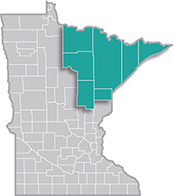 Home to the state's second-largest metro, the Northeast Region has a strong industrial sector, tied largely to the area's abundant natural resources.
Home to the state's second-largest metro, the Northeast Region has a strong industrial sector, tied largely to the area's abundant natural resources.
Most of the manufacturing base centers on mining and forest products industries. More than half of the sector's employment is in paper and machinery manufacturing.
Want the freshest data delivered by email? Subscribe to our regional newsletters.
12/4/2020 9:00:00 AM
Carson Gorecki
Indigenous peoples have lived and traded in the area now called Minnesota for thousands of years. The eleven sovereign tribal nations in the state consist of seven Ojibwe (Chippewa, Anishinaabe) reservations and four Dakota (Sioux) communities. According to the U.S. Census Bureau's American Community Survey, Native Americans represent 1.7% of Minnesota's and 2.7% of Northeast Minnesota's population, making it the second largest racial or ethnic group in the region after white people. Of the six planning regions in the state, only Northwest Minnesota has a larger Indigenous population share. Of the 24,593 Native Americans in Minnesota's workforce, more than 15% call the Northeast region home. In turn, those 3,746 Native American workers represent 2.3% of Northeast Minnesota's labor force – again the second largest racial or ethnic group following white workers.
Native American workers in Northeast Minnesota represent almost every industry but are employed in the largest numbers in service industries such as Public Administration, Health Care and Social Assistance, Arts, Entertainment, and Recreation, and Accommodation and Food Services. According to data from the U.S. Census' Quarterly Workforce Indicators, in 2019 Native Americans made up 16.1% of the Arts, Entertainment, and Recreation workforce. Native American workers also filled 9.6% of Public Administration jobs and 3.2% of Accommodation and Food Service jobs (see Table 1).
| Table 1. Top 10 Employing Industries for Native Americans in Northeast Minnesota, 2019 | ||||
|---|---|---|---|---|
| Industry | Native American Workers | Percent of Native American Workers | Native Americans as a Percent of All Workers | Industry Average Annual Wage |
| Public Administration | 870 | 25.1% | 9.6% | $53,606 |
| Health Care and Social Assistance | 549 | 15.8% | 1.6% | $51,700 |
| Arts, Entertainment, and Recreation | 518 | 14.9% | 16.1% | $24,438 |
| Accommodation and Food Services | 419 | 12.1% | 3.2% | $17,199 |
| Retail Trade | 267 | 7.7% | 1.7% | $27,269 |
| Educational Services | 185 | 5.3% | 1.4% | $46,202 |
| Construction | 157 | 4.5% | 2.1% | $63,627 |
| Administrative Support and Waste Mgmt. Svcs. | 100 | 2.9% | 2.8% | $30,370 |
| Transportation and Warehousing | 89 | 2.6% | 1.1% | $53,679 |
| Other Services (except Public Administration) | 78 | 2.2% | 1.5% | $28,813 |
| Manufacturing | 78 | 2.2% | 1.0% | $61,576 |
| Total, All Industries | 3,469 | 100.0% | 2.5% | $46,663 |
| Source: U.S. Census Quarterly Workforce Indicators, DEED Quarterly Census of Employment and Wages | ||||
It is worth noting the five industries that employ the most Indigenous workers include the three lowest paying on average. Accommodation and Food Services and Arts, Entertainment, and Recreation both have higher than average shares of Native American workers, but also pay annual wages much lower than the regional average. These industry trends may translate to lower household incomes for members of Indigenous communities. While incomes have grown since 2010, Native American households still earn a median income equivalent to 60.4% of white households. Similarly, Native Americans are almost three time more likely to be in poverty and more than three times as likely to be unemployed than white people in the region.
Indigenous peoples have been and will continue to be very important contributors in Northeast Minnesota, both economically and culturally, and we must continue to work on addressing serious economic and employment disparities. If disparities are addressed and gaps closed, Native Americans, as well as everyone else, can expect to benefit from a more diverse and equitable economy.
Contact Northeast Minnesota Labor Market Analyst Carson Gorecki at 218-302-8413.